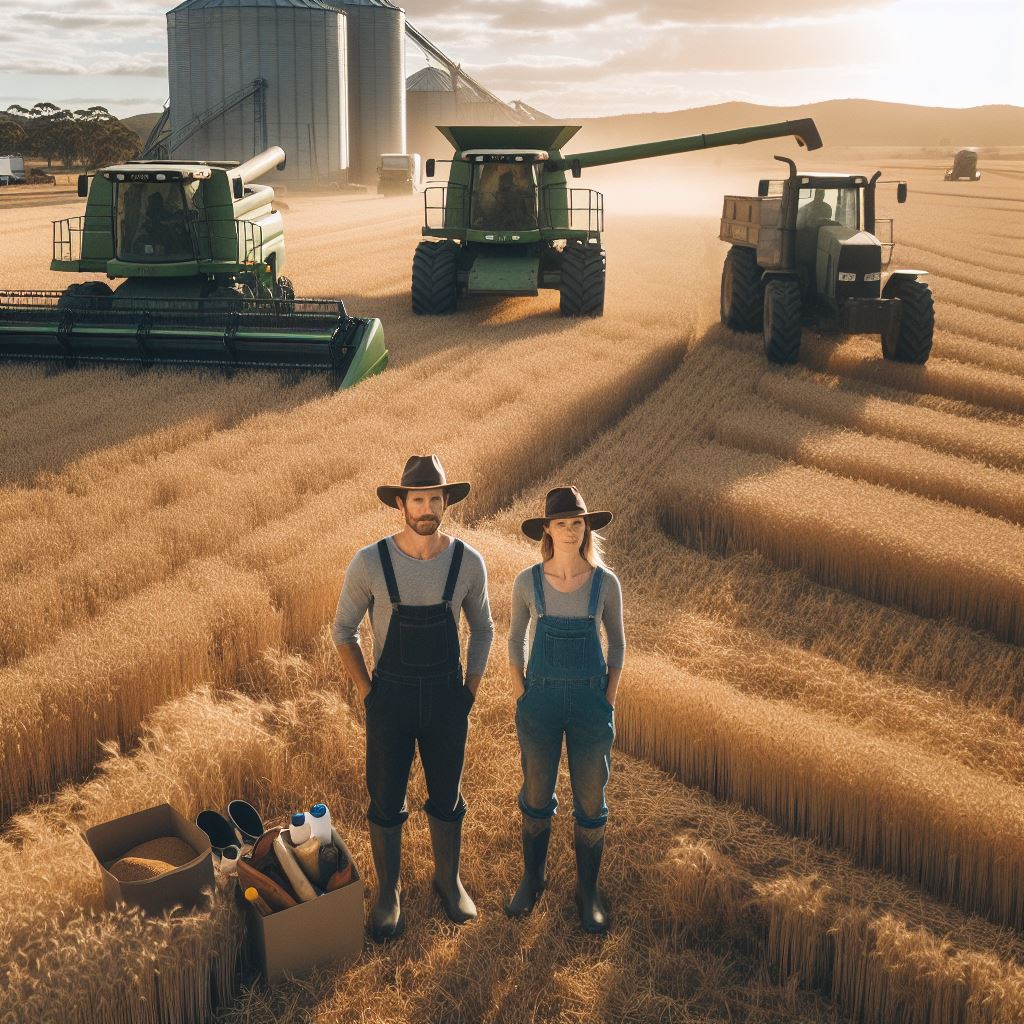Introduction
In this blog post, we will delve into the daily lives of Australian farmers, providing unique insights into their routines and experiences. Our aim is to shed light on the importance of agriculture in both Australia’s economy and society. let’s discuss on Aussie Farmer
The agricultural sector holds a significant place in Australia, generating revenue, forming the backbone of rural communities, and supplying food and resources for the nation.
It serves as a vital contributor to the overall stability and growth of the economy.
Beyond its economic impact, farming plays a crucial role in the fabric of Australian society. It shapes the way people connect with the land, preserving traditions, and fostering a deep sense of rural identity.
The life of an Aussie farmer is far from ordinary; it embodies resilience, perseverance, and a strong connection to nature.
Through this blog post, we seek to provide an authentic glimpse into the daily realities faced by our hardworking farmers.
From the early morning wake-up calls to tend to livestock, the painstaking maintenance of crops, and the constant battle against the unpredictable forces of nature, their lives are a testament to dedication and hard work.
By sharing first-hand stories and experiences, we hope to foster a greater appreciation for the challenges faced by Australian farmers.
It is our belief that understanding the crucial role they play in our society will encourage support and inspire innovation in the agricultural industry.
Join us on this enlightening journey as we step into the shoes of Aussie farmers and gain a newfound respect for their unwavering commitment to feeding and sustaining our nation.
Background on Australian farming industry
- Agricultural sector in Australia plays a crucial role in the country’s economy.
- Australia is known for its diverse farming practices, ranging from livestock farming to crop cultivation.
- Farmers in the country engage in various types of farming, including dairy farming, poultry farming, and vegetable production.
- Agriculture contributes significantly to Australia’s food security by ensuring domestic food production.
- The farming industry also plays a vital role in Australia’s export industry, providing a range of agricultural products to the global market.
Australia’s agricultural sector is a cornerstone of the country’s economy and plays a crucial role in ensuring food security and contributing to the export industry. Let’s explore the various aspects of the Australian farming industry.
Overview of the agricultural sector in Australia
The agricultural sector in Australia is diverse and encompasses a wide range of farming practices. Farmers in Australia are engaged in livestock farming, crop cultivation, dairy farming, and more.
These farming practices are spread across the vast landscapes of the country.
Types of farming practiced in the country
- Livestock farming: Australia is known for its extensive livestock farming, with cattle and sheep being the primary focus. Ranches and farms across the country rear these animals for meat and wool production.
- Crop cultivation: Australian farmers grow a variety of crops, including wheat, barley, canola, and cotton. The crops are cultivated in different regions, taking advantage of the diverse climatic conditions.
- Dairy farming: Australia is one of the largest producers of dairy products, with dairy farms located in various regions. Fresh milk, cheese, and butter are some of the significant produce from the dairy industry.
- Poultry farming: The poultry industry in Australia is booming, with a significant focus on chicken and egg production. Poultry farms adhere to strict quality standards to meet the demands of both domestic and international markets.
Significance of farming for Australia’s food security and export industry
Agriculture plays a vital role in ensuring Australia’s food security. By engaging in diverse farming practices, the country can produce enough food to meet the domestic demand. This reduces reliance on imported food products, ensuring self-sufficiency.
Moreover, the farming industry also contributes to Australia’s export industry. The country exports a wide range of agricultural products to global markets, including grains, meat, dairy products, and fresh produce.
These exports generate significant revenue for the country, supporting the overall economy.
In review, the Australian farming industry is characterized by its diversity and importance in ensuring food security and supporting the export industry.
Through livestock farming, crop cultivation, and other farming practices, Australia can meet its domestic food demands while contributing to the global market.
The agricultural sector remains a vital part of the country’s economy and its sustainable development.
Read: Must-Attend Chemistry Conferences in Aus
Interview with Farmer 1: John Smith
Introduce John Smith as an experienced farmer from a rural area in Australia.
John Smith is a seasoned farmer hailing from a remote countryside in Australia. With years of experience under his belt, he has become a well-respected figure in the farming community.
Describe his farm and the type of farming he specializes in (e.g., cattle, wheat).
His farm spans across vast acres of fertile land, dotted with lush green pastures and robust crops. John specializes in cattle farming, rearing healthy and prime cattle for meat production.
Your Personalized Career Strategy
Unlock your potential with tailored career consulting. Get clear, actionable steps designed for your success. Start now!
Get StartedDetail his daily routine, starting from waking up early in the morning.
Every day, as the sun peeks over the horizon, John Smith springs out of bed at the crack of dawn. The first rays of sunlight fill him with joy and anticipation for the day ahead.
The various tasks he performs throughout the day, such as feeding animals, tending to crops, and maintenance.
After a hearty breakfast, John heads straight to the barn to feed and water his livestock. He meticulously inspects each animal to ensure they are healthy and content.
He then moves on to tending to his flourishing wheat crops, carefully nurturing them and protecting them from pests and adverse weather conditions. Maintenance tasks, such as repairing fences and equipment, also occupy his time.
Any challenges he faces in his occupation and how he overcomes them.
One of the biggest challenges John faces is unpredictable weather. Droughts and floods have the potential to devastate his farm. However, he has learned to adapt and implement irrigation systems and water conservation techniques to mitigate the impact.
Additionally, market fluctuations and economic pressures have compelled him to diversify his income streams through various agricultural ventures.
Share any interesting anecdotes or stories related to his farming experiences.
Once, John encountered a stubborn calf stuck in muddy terrain. With determination and quick thinking, he gathered a group of fellow farmers, utilizing a tractor and ropes to rescue the distressed animal.
This incident solidified the sense of camaraderie and mutual support among the local farming community.
In short, John Smith’s life as a farmer is one filled with dedication, hard work, and an unyielding passion for the land.
Undeterred by challenges, he continues to thrive, contributing to the agricultural sector and playing a vital role in feeding his nation. He is a testament to the resilience and tenacity of Australian farmers.
Read: Innovative Chemistry Startups in Australia
Interview with Farmer 2: Sarah Thompson
Today, I had the pleasure of sitting down with Sarah Thompson, a young farmer who runs a family-owned farm. Sarah is passionate about organic farming and utilizes sustainable methods to ensure the health and wellbeing of her land and animals.
Located just outside of Melbourne, Sarah’s farm is a picturesque sight. Rolling green pastures stretch out as far as the eye can see, dotted with contented cows and sheep grazing peacefully.
What sets Sarah’s farm apart from others in the area is her commitment to organic farming practices.
As we delve into Sarah’s daily schedule, it is evident that being a farmer is no easy task. With the sun as her alarm clock, Sarah starts her day at the crack of dawn, tending to her livestock before the intense Australian heat sets in.
Her main responsibilities include ensuring the well-being of her animals, planting and maintaining crops, and marketing her farm products.
Detail her daily schedule and responsibilities, including managing livestock, planting crops, and marketing her products
Technology plays an integral role in Sarah’s farming operations. She embraces technology as a means to optimize her time and streamline tasks.
Sarah uses drones to survey her land and identify any potential issues or areas that need attention. Additionally, she uses automated irrigation systems to conserve water and increase efficiency in crop growth.
Sarah believes that incorporating technology into farming practices is essential for the future of agriculture in Australia.
When discussing the future of farming in Australia, Sarah expresses optimism. She believes that organic and sustainable farming practices will continue to gain traction as consumers become more aware of the benefits.
Sarah foresees innovations in farming techniques, such as vertical farming and hydroponics, to become more prevalent in the coming years. These methods provide opportunities for farmers to maximize limited space and resources.
As our conversation comes to a close, Sarah expresses her unwavering dedication to the land and the farming profession. She hopes that more young people will consider a career in agriculture and contribute to its growth.
Sarah believes that by embracing sustainable methods and harnessing the power of technology, the future of farming in Australia is bright.
Basically, Sarah Thompson is a shining example of a young farmer who is making a difference in the industry.
Through her commitment to organic farming, sustainable practices, and embracing technology, she is leading the way towards a more sustainable and prosperous future for Australian agriculture.
Stand Out with a Resume That Gets Results
Your career is worth more than a generic template. Let us craft a resume and cover letter that showcase your unique strengths and help you secure that dream job.
Get HiredRead: Navigating Chem Grad Studies in Australia

Overview of common challenges faced by Australian farmers
In Australia, farmers face a multitude of challenges that can greatly impact their livelihoods. From climate change to market fluctuations, these obstacles require resilience and adaptation.
This section will delve into the common challenges experienced by Australian farmers, the effects of climate change, and the support systems available to them.
Common Challenges Faced by Australian Farmers
- Drought: Frequent and prolonged periods of drought pose a significant threat to agricultural productivity.
- Bushfires: Australia’s hot and dry climate makes farmers vulnerable to devastating bushfires.
- Market fluctuations: Farmers often struggle with unpredictable markets that affect the prices of their produce.
- Access to water: Limited access to water resources makes irrigation and livestock management challenging.
- High input costs: Farmers face rising costs of inputs such as fuel, fertilizers, and machinery.
These challenges can have a devastating impact on farming communities, leading to financial strain, mental health issues, and ultimately, the closure of family farms.
The Impact of Climate Change on Farming
Climate change exacerbates the challenges faced by Australian farmers. It leads to higher temperatures, changes in rainfall patterns, and increases the frequency and intensity of extreme weather events like droughts and floods.
These climatic shifts directly affect crop yields, water availability, and livestock production.
Farmers are witnessing unpredictable growing seasons, with shorter and more erratic rainfall, making crop planning and management more difficult.
Rising average temperatures also create ideal conditions for pests and diseases, further threatening agricultural productivity.
Efforts to Adapt
Australian farmers are resilient and have been implementing various strategies to adapt to climate change:
- Implementing improved irrigation systems and water management practices to optimize water usage.
- Exploring drought-resistant crop varieties and alternative farming techniques.
- Investing in sustainable practices, such as soil conservation and regenerative farming.
- Working closely with scientists and researchers to develop innovative technologies and strategies.
Despite these efforts, the unpredictable nature of climate change still presents significant challenges for farmers.
Support Systems for Australian Farmers
The Australian government and various organizations provide support systems to help farmers navigate these challenges:
- Government assistance programs offer financial support during times of crisis, such as drought relief funds.
- Rural financial counseling services provide free advice to farmers regarding financial and business planning.
- Drought and disaster recovery initiatives aim to help farmers recover from the impacts of natural disasters.
- Community initiatives, such as mental health support networks, provide farmers with emotional and psychological assistance.
These support systems are crucial in ensuring the resilience and viability of the farming community in Australia.
Australian farmers face a myriad of challenges, exacerbated by a changing climate. From droughts and bushfires to market fluctuations, their livelihoods are constantly at risk.
However, through resilience, adaptation, and the support of government programs and community initiatives, farmers continue to drive Australia’s agricultural industry forward.
Read: Balancing Lab Work and Life in Australia
Conclusion
In closing, the interviews with the Aussie farmers have provided valuable insights into their daily lives. We have seen firsthand the immense hard work, dedication, and resilience exhibited by these individuals.
Australian farmers face numerous challenges, from unpredictable weather conditions to market fluctuations, yet they continue to persevere and provide for their communities. It is truly remarkable to witness their commitment to their craft.
As readers, it is crucial for us to appreciate and support the farming industry. By buying locally produced goods, we can contribute to the sustainability of these farms and ensure the longevity of this crucial sector.
Additionally, advocating for sustainable farming practices will help protect the environment and ensure a healthier future for all.
Transform Your LinkedIn for Maximum Impact
Elevate your professional brand with a LinkedIn profile that attracts recruiters, showcases your expertise, and maximizes opportunities. Stand out in your industry with a profile built for success.
Boost ProfileLet us not take for granted the toil and sacrifices made by Australian farmers. They play a vital role in ensuring food security and deserve our recognition and gratitude.
As individuals, we can make a difference by actively supporting our local farmers and spreading awareness about the importance of sustainable agriculture.
So, the next time you go grocery shopping, choose to buy locally produced goods. Be mindful of where your food comes from and how it is grown.
Together, we can create a thriving and sustainable farming industry that will benefit not only the farmers but also our communities and the environment. Support Australian farmers and be a part of the change.




